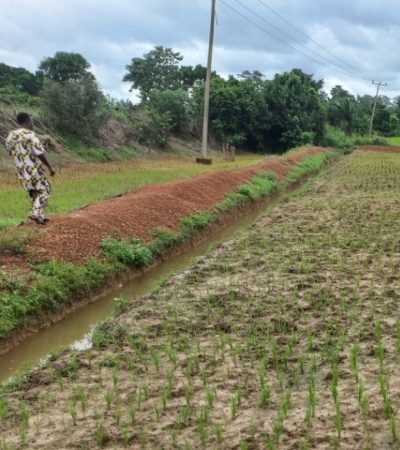When Liberians celebrated Independence Day on July 26, the Ministry of Commerce sent a bag of rice to President Ellen Johnson Sirleaf’s mansion. What made the gesture extraordinary is what the rice represents: Liberia’s emerging market for locally grown rice and the government’s commitment to support the transformation.
Since the end of a 14-year civil war in 2003, Liberia has depended on subsidized rice imports to feed a population of more than four million. For decades, Liberians have farmed on a subsistence level and could not grow enough food to feed the entire country. Liberia is one of Africa’s least food-secure countries, and the need for a sustainable rice industry is critical.
The rice delivered to the President was grown by Liberian farmers in Lofa County – part of a region known as the country’s breadbasket – and milled by local processor Fabrar Liberia with support from Feed the Future’s Food & Enterprise Development program, managed by the U.S. Agency for International Development. The largest Feed the Future program in Africa, it works all along the value chains for rice and other agricultural products, engaging smallholder farmers, input suppliers, processors and other businesses, and even working directly with government to make Liberia’s markets more sustainable and investment-ready.
In concert with Feed the Future, Liberia’s government and private sector play key roles in improving the rice value chain. Each year, the Government of Liberia procures large quantities of rice for employees, school feeding programs, and humanitarian assistance projects amounting to over 3,500 metric tons. In the past, that rice was supplied entirely by foreign imports, but now it can be sourced from local farmers and processers who are increasingly building their capacity to service large contracts. To support this effort, the Government of Liberia recently passed legislation that requires government entities to set aside at least 25 percent of all public procurement opportunities for Liberian businesses.
Local companies like Fabrar Liberia are critical to expanding Liberia’s rice market. Feed the Future has supported Fabrar Liberia through the renovation of its warehouse facilities, the purchase and installation of Liberia’s first automated rice milling line, and an electric power generator which runs on non-edible palm oil instead of gasoline. Fabrar Liberia plans to sell the rice on the local market, targeting consumers in Monrovia as well as large scale rice contracts in the private sector and the government. In May 2014, Fabrar Liberia bought 163 metric tons of rice worth $63,500 USD from 550 farmers inLofa County, the largest procurement of rice by a local processor in the history of the country.
“The rice sector is improving in production and organization, and our capacity to mill rice is higher than it has ever been in Liberia’s history. While Feed the Future increases the capacity of farmers, the government and the private sector need to unite under a moral obligation to buy local rice,” says the CEO of Fabrar Liberia, Fabio Lavelanet.
The rice delivered to President Sirleaf was one of 100 bags of rice the Ministry of Commerce procured for humanitarian assistance – a small purchase but a sign of growing opportunity for the country’s smallholder farmers and agricultural businesses.
“With this initial purchase, the Ministry of Commerce hopes to kick-start the process and encourage other ministries to follow suit. We are committed to supporting local farmers and expect to purchase more locally grown rice to fulfill our rice requirement in the future,” says Pewee Reed, Director of the Ministry of Commerce’s Micro, Small & Medium Enterprise Division.


